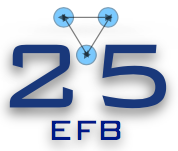Speaker
Description
A consistent nonrelativistic Effective Field Theory exists for which the scattering length $a$ is large and the effective range $r_0$ is large in magnitude but negative. Such systems can for example be found in heavy mesons. Observables depend then only on the universal ratio $\xi=2r_0/a$, with $|r_0|$ fixing the overall distance scale. The two-body scattering amplitude displays two shallow $S$-wave poles whose position in the complex plane is determined by $\xi$. We investigate here how the bound-state energies of three identical bosons depend on $\xi$, for a two-body system with one bound and one virtual state, or with two virtual states. We compare our results with
those of Efimov's discrete scale invariance, as $|r_0|\to0$ is reduced. In ontradistinction to that case, no three-body interaction is needed to stabilise the system. Instead, a well-defined ground state exists for a limited range of $\xi$ around the ``quasi-unitarity point'' $\xi=0$, and excitations for even smaller ranges. Interpreting the Efimov version $r_0=0$ as a low-energy theory, one matches the spectra to determine its scale-breaking parameter $\overline{\Lambda}$. We also compare the phase shifts for the
scattering of a boson on the two-boson bound state with that of the equivalent Efimov system.
Work conducted in collaboration with U.~van Kolck (Universit\´e Paris-Saclay,
CNRS/IN2P3 and University of Arizona)

